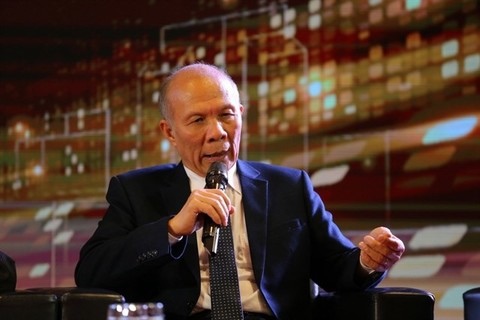Removing bottlenecks for domestic petroleum market
Removing bottlenecks for domestic petroleum market
Although the Government has made many amendments to mechanisms and policies towards a market economy, petroleum trading has not achieved the expected results. Industry insiders have proposed a petroleum trading floor to effectively manage and operate the market. Economic expert Đinh Trọng Thịnh spoke to the Vietnam News Agency's Tin Tức (News) newspaper about the issue.

Economic expert Đinh Trọng Thịnh. — Photo baotintuc.vn |
An administrative price mechanism remains a bottleneck in the decrees on petroleum trading. What do you think about establishing a petroleum exchange floor to increase transparency?
A petroleum exchange floor is where key petroleum businesses, retailers and distributors can publicly disclose prices and volumes, minimise risks and create equal opportunities for business entities, reduce selling prices for petroleum and benefit consumers, as pricing is close to imported sources.
The trading floor will also be a source of reliable information on the volume, price and quality of petroleum products, helping State management agencies make accurate forecasts and avoid supply chain disruptions.
Two petrochemical refineries, 38 key trading enterprises, over 320 distributors and representatives of private petroleum enterprises in more than 17,000 petroleum retail stores are expected to join the exchange floor.
The State can assign a unit to establish the exchange floor. This unit will be in charge of setting out principles and policies to monitor operations and collect taxes and fees by the volume of transactions on the floor.
Accordingly, sellers can list the time, location, type of goods, quality, quantity and price. Buyers can consider making contracts to purchase products from the selling entities at appropriate prices.
To ensure the legality and strict implementation of the exchange floor's regulations and the rights of the participating parties, I think it is necessary to establish an independent monitoring agency in addition to facilitating the application of blockchain technology and artificial intelligence in monitoring to detect unusual transactions.
What solutions are needed to effectively manage and operate the petroleum trading floor?
First of all, Việt Nam needs to quickly build a legal framework related to the floor establishment to provide a sufficient legal basis for its operation.
I think, the Vietnam Commodity Exchange can be in charge of building and managing the floor, based on the regulations of the State management agencies on the operating mechanism.
At the same time, the country must have a mechanism to establish the exchange floor promptly so all entities can participate in transacting, directly purchasing and selling on the floor.
In terms of prices, in the immediate future, State agencies need to publicise the calculation formula and the ceiling price of petroleum besides the maximum wholesale and retail prices to ensure that the market can operate stably.
Sellers will compete fairly in determining the selling price, but it must be lower than the prescribed ceiling price. Buyers can proactively choose to purchase from the entity with the lowest price and the most suitable conditions. In the long term, the market and businesses will gradually decide on prices.
The Ministry of Industry and Trade needs to allocate minimum production and import rates and appropriate supply periods for factories and qualified petroleum import centres. These centres must comply with the rate and time and ensure stable consumption in their systems and the amount of petroleum reserved for business.
Over the long term, businesses will determine and calculate the quantity of petroleum products purchased in the domestic market and imported internationally to meet market requirements.
Meanwhile, the country needs to renew the management method and Government intervention in the price fluctuations of the petroleum market.
I suggest that the State should gradually intervene in market prices by increasing or decreasing the supply of petroleum by releasing national reserves or increasing reserve purchases.
In my opinion, it is time to establish a national petroleum reserve in each region to serve the need for energy security.
|
Petrol prices revised down Retail prices of petrol products have been adjusted down recently by the Ministry of Industry and Trade and the Ministry of Finance. From 3pm on September 12, the price of E5RON92 bio-fuel was cut by VNĐ1,089 per litre, to no more than VNĐ18,890 (US$0.77) per litre, while that of RON95-III fell by VNĐ1,192 to VNĐ19,635 per litre, when at the maximum. Meanwhile, diesel 0.05S is capped at VNĐ17,165 per litre, down VNĐ927 per litre. The kerosene price is not higher than VNĐ17,790 per litre, down VNĐ934 per litre. Mazut oil 180CST 3.5S is now sold at not higher than VNĐ14,467 per kg, down VNĐ688. The two ministries also decided not to use the petrol price stabilisation fund this time. |




























